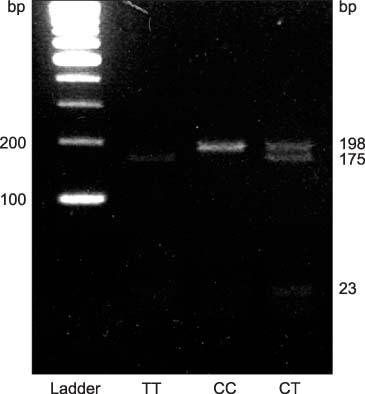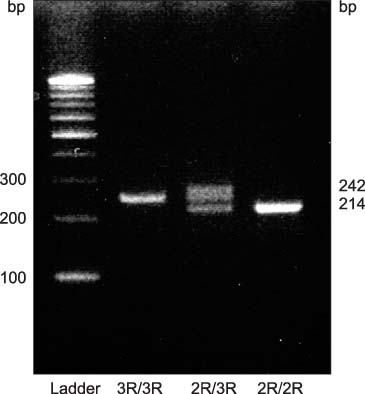J Korean Surg Soc.
2010 Jul;79(1):27-34. 10.4174/jkss.2010.79.1.27.
Gastric Cancer Susceptibility according to Methylenetetrahydrofolate Reductase and Thymidylate Synthase Gene Polymorphism
- Affiliations
-
- 1Department of Surgery, Seoul Mary's Hospital, The Catholic University of Korea, Seoul, Korea. hmjeon@catholic.ac.kr
- KMID: 1455484
- DOI: http://doi.org/10.4174/jkss.2010.79.1.27
Abstract
- PURPOSE
The genetic polymorphism and intracellular activity of methylenetetrahydrofolate reductase (MTHFR) and thymidylate synthase (TS) is clinically associated with carcinogenesis and biological therapeutic effect in gastrointestinal malignancies. We aimed to elucidate the susceptibility of gastric cancer according to MTHFR and TS gene polymorphism.
METHODS
This study was designed as a hospital-based case-control study in a single institute. The gastric cancer group (n=300) for the study was diagnosed at first time as tubular adenocarcinoma, and the control group (n=100) was diagnosed as no malignancy in the endoscopic biopsy. The genetic polymorphism of TS and MTHFR were confirmed by PCR.
RESULTS
The MTHFR mutant type had a more than 2-fold increased risk of developing gastric cancer (RR: 2.341). But, only heterozygote type (677CT) revealed significantly higher susceptibility compared to wild type (RR: 2.581). In TS gene genotype, the mutant genotype rate (2R/3R and 3R/3R) was significantly higher in gastric cancer group compared to control group (P=0.008), and the mutant type had a more than 3-fold increased risk of developing gastric cancer (RR: 3.222). In combined MTHFR and TS, 677CT+2R/3R and 677CT+3R/3R there was more than a 3-fold increased risk rate of developing gastric cancer compared with other combinations (RR, 3.474 in 677CT with 2R/3R; RR, 3.895 in 677CT with 3R/3R).
CONCLUSION
This study shows a significant association between the MTHFR and TS polymorphisms and susceptibility to gastric cancer, providing a genetic basis. The polymorphisms study of two genes could be applied as susceptibility markers, clinically, for gastric cancer.
MeSH Terms
Figure
Reference
-
1. El-Rifai W, Powell SM. Molecular biology of gastric cancer. Semin Radiat Oncol. 2002. 12:128–140.2. Gonzalez CA, Sala N, Capella G. Genetic susceptibility and gastric cancer risk. Int J Cancer. 2002. 100:249–260.3. Gonzalez CA, Riboli E, Badosa J, Batiste E, Cardona T, Pita S, et al. Nutritional factors and gastric cancer in Spain. Am J Epidemiol. 1994. 139:466–473.4. Kim YI. Methylenetetrahydrofolate reductase polymorphisms, folate, and cancer risk: a paradigm of gene-nutrient interactions in carcinogenesis. Nutr Rev. 2000. 58:205–209.5. Pogribny IP, Basnakian AG, Miller BJ, Lopatina NG, Poirier LA, James SJ. Breaks in genomic DNA and within the p53 gene are associated with hypomethylation in livers of folate/methyl-deficient rats. Cancer Res. 1995. 55:1894–1901.6. Kim YI, Pogribny IP, Basnakian AG, Miller JW, Selhub J, James SJ, et al. Folate deficiency in rats induces DNA strand breaks and hypomethylation within the p53 tumor suppressor gene. Am J Clin Nutr. 1997. 65:46–52.7. Choi SW, Mason JB. Folate and carcinogenesis: an integrated scheme. J Nutr. 2000. 130:129–132.8. Weisberg I, Tran P, Christensen B, Sibani S, Rozen R. A second genetic polymorphism in methylenetetrahydrofolate reductase (MTHFR) associated with decreased enzyme activity. Mol Genet Metab. 1998. 64:169–172.9. Nelen WL, Blom HJ, Thomas CM, Steegers EA, Boers GH, Eskes TK. Methylenetetrahydrofolate reductase polymorphism affects the change in homocysteine and folate concentrations resulting from low dose folic acid supplementation in women with unexplained recurrent miscarriages. J Nutr. 1998. 128:1336–1341.10. Mandola MV, Stoehlmacher J, Muller-Weeks S, Cesarone G, Yu MC, Lenz HJ, et al. A novel single nucleotide polymorphism within the 5' tandem repeat polymorphism of the thymidylate synthase gene abolishes USF-1 binding and alters transcriptional activity. Cancer Res. 2003. 63:2898–2904.11. Kawakami K, Salonga D, Park JM, Danenberg KD, Uetake H, Brabender J, et al. Different lengths of a polymorphic repeat sequence in the thymidylate synthase gene affect translational efficiency but not its gene expression. Clin Cancer Res. 2001. 7:4096–4101.12. Trinh BN, Ong CN, Coetzee GA, Yu MC, Laird PW. Thymidylate synthase: a novel genetic determinant of plasma homocysteine and folate levels. Hum Genet. 2002. 111:299–302.13. Song C, Xing D, Tan W, Wei Q, Lin D. Methylenetetrahydrofolate reductase polymorphisms increase risk of esophageal squamous cell carcinoma in a Chinese population. Cancer Res. 2001. 61:3272–3275.14. Esteller M, Garcia A, Martinez-Palones JM, Xercavins J, Reventos J. Germ line polymorphisms in cytochrome-P450 1A1 (C4887 CYP1A1) and methylenetetrahydrofolate reductase (MTHFR) genes and endometrial cancer susceptibility. Carcinogenesis. 1997. 18:2307–2311.15. Campbell IG, Baxter SW, Eccles DM, Choong DY. Methylenetetrahydrofolate reductase polymorphism and susceptibility to breast cancer. Breast Cancer Res. 2002. 4:R14.16. Gusella M, Frigo AC, Bolzonella C, Marinelli R, Barile C, Bononi A, et al. Predictors of survival and toxicity in patients on adjuvant therapy with 5-fluorouracil for colorectal cancer. Br J Cancer. 2009. 100:1549–1557.17. Gonzalez FJ. The role of carcinogen-metabolizing enzyme polymorphisms in cancer susceptibility. Reprod Toxicol. 1997. 11:397–412.18. Stern LL, Mason JB, Selhub J, Choi SW. Genomic DNA hypomethylation, a characteristic of most cancers, is present in peripheral leukocytes of individuals who are homozygous for the C677T polymorphism in the methylenetetrahydrofolate reductase gene. Cancer Epidemiol Biomarkers Prev. 2000. 9:849–853.19. Guttormsen AB, Ueland PM, Nesthus I, Nygard O, Schneede J, Vollset SE, et al. The Hordaland Homocysteine Study. Determinants and vitamin responsiveness of intermediate hyperhomocysteinemia (> or =40 micromol/liter). J Clin Invest. 1996. 98:2174–2183.20. Ulrich CM, Kampman E, Bigler J, Schwartz SM, Chen C, Bostick R, et al. Colorectal adenomas and the C677T MTHFR polymorphism: evidence for gene-environment interaction? Cancer Epidemiol Biomarkers Prev. 1999. 8:659–668.21. Ma J, Stampfer MJ, Giovannucci E, Artigas C, Hunter DJ, Fuchs C, et al. Methylenetetrahydrofolate reductase polymorphism, dietary interactions, and risk of colorectal cancer. Cancer Res. 1997. 57:1098–1102.22. Kawakami K, Omura K, Kanehira E, Watanabe Y. Polymorphic tandem repeats in the thymidylate synthase gene is associated with its protein expression in human gastrointestinal cancers. Anticancer Res. 1999. 19:3249–3252.23. Pullarkat ST, Stoehlmacher J, Ghaderi V, Xiong YP, Ingles SA, Sherrod A, et al. Thymidylate synthase gene polymorphism determines response and toxicity of 5-FU chemotherapy. Pharmacogenomics J. 2001. 1:65–70.24. Etienne MC, Chazal M, Laurent-Puig P, Magne N, Rosty C, Formento JL, et al. Prognostic value of tumoral thymidylate synthase and p53 in metastatic colorectal cancer patients receiving fluorouracil-based chemotherapy: phenotypic and genotypic analyses. J Clin Oncol. 2002. 20:2832–2843.25. Omura K, Kawakami K, Kanehira E, Nagasato A, Kawashima S, Tawaraya K, et al. The number of 5-fluoro-2'-deoxyuridine-5-monophosphate binding sites and reduced folate pool in human colorectal carcinoma tissues: changes after tegafur and uracil treatment. Cancer Res. 1995. 55:3897–3901.26. Peters GJ, van Triest B, Backus HH, Kuiper CM, van der Wilt CL, Pinedo HM. Molecular downstream events and induction of thymidylate synthase in mutant and wild-type p53 colon cancer cell lines after treatment with 5-fluorouracil and the thymidylate synthase inhibitor raltitrexed. Eur J Cancer. 2000. 36:916–924.
- Full Text Links
- Actions
-
Cited
- CITED
-
- Close
- Share
- Similar articles
-
- Clinical Significance of Thymidylate Synthase and Methylenetetrahydrofolate Reductase Gene Polymorphism in Korean Patients with Gastric Cancer
- A study on the genetic polymorphism of methylenetetrahydrofolate reductase in egnancy - induced hypertensive patient
- The Relationship of Methylenetetrahydrofolate Reductase(MTHFR) C677T, Thymidylate Synthase(TS) Gene Polymorphism and Epilepsy
- Homocysteine, folate, and methylenetetrahydrofolate reductase polymorphism in Korean normal subjects
- The effect of Thymidylate Synthetase extression in stomach cancer tissues on the prognosis



